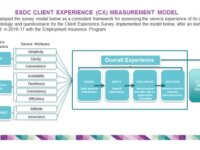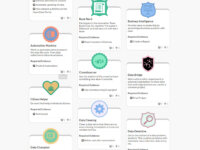The Client Experience Measurement Survey Model was developed by Employment and Social Development Canada to gather and analyse client feedback to improve service delivery to its clients. Canadians have been able to express their views on government programs and services, which have informed the way programs and services are designed and delivered. The survey allows the tracking of service satisfaction, ease of access, effectiveness of service delivery, and the experience of particular programs…
Innovation Tag: Data
MEData is the strategy for providing, appropriating and using the public data of Medellin. It will become the official information source of the city, where citizens will have constant and reliable data that can be used to generate knowledge, promote technological innovation and boost economy. it is the first government platform that integrates strategic information sources into a big data technology and automatically synchronizes them with an open data portal.
The promotion of competition has been identified as one of the major challenges of the Public Procurement System in Colombia. Despite its importance, it was only in 2019 that a tool allowing to effectively monitor the participation of the interested parties on the bidding processes was developed and implemented by the Colombian Procurement Agency. Thanks to this tool, participants are able to diagnose flaws, and make suggestions or requests for improvements.
Originally conceived as a planning tool, HeritageMaps.ie is a user-driven, web-based mapviewer focusing on the built, cultural and natural heritage around Ireland and offshore. Its potential for use by the general public was quickly realised and users can now access 700+ up-to-date heritage datasets in map-form, originally provided across many Govt. platforms. HeritageMaps.ie a free ‘one-stop-shop’ for heritage data and acts as a discovery portal, providing direct links to promote research.
The Louisville Metro Badge Program rewards employees for tasks like creating an open dataset, crowdsourcing information from citizens or collaborating with other departments on projects. There’s a tiered reward system for civil servants who participate, with prizes ranging from LinkedIn recommendations to recognition at a city-wide awards ceremony.
The MSIP Observatory is an interactive tool presenting spatial data of the City of Krakow useful for residents, investors, tourists and anyone interested in our city. The map consists of many layers presenting different kinds of information i.e on architecture and urban planning, nature protection and ecology, administration and security, tourism and history of the city. It's interactive and user-friendly and it implements the idea of open government and open data.
Latvia’s E-index is the first national-level initiative helping central government institutions and municipalities to evaluate and recognize their level of digital transformation, foreseen solutions and learn from other institutions. This enables and motivates the development of the e-environment. Within the spirit of positive competition, the common goal is raising awareness of digital transformation, learning about policy and tools, and increasing quality and accessibility of services to…
The integration of health and social care was seen by the Scottish government to require support to ensure that benefits of both national and local data and knowledge were able to be shared across two very different cultures and service providers to jointly develop more appropriate services for local populations.
LIST using their expertise in analytical work was seen as a way to develop a sound evidence base to allow decision makers to develop effective services.
BPA or technology-enabled automation of rules based business processes was identified as an opportunity to streamline the operational business of the Organisation, to achieve simplicity, improve service delivery and reduce costs. The innovation engages BPA to digitally transform workflows from conventional data manipulation and record-keeping functions, to efficient automated systems. BPA has benefitted front line staff, where the burden of processes has transferred from humans to technology.
Transport Canada has piloted the use of Artificial Intelligence (AI) to perform risk-based oversight by scanning Pre-loading Advance Cargo Information (PLACI) to identify potential air cargo threats (i.e. “bomb-in-a-box” scenario). By using AI to perform this function, there is potential for Transport Canada to save 1,000’s of hours and conduct risk assessments on all air cargo shipments coming from abroad -- in real-time.


